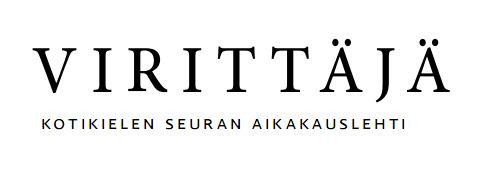Palvelurakennemuutoksen diskurssit: Erikoissanaston käyttö kaupunkiorganisaation suunnittelukokouksissa
DOI:
https://doi.org/10.23982/vir.58988Avainsanat:
erikoissanasto, hallinnan diskurssi, organisaatiomuutos, palvelun diskurssi, kokousvuorovaikutus, diskurssiAbstrakti
Tutkimus käsittelee organisaatiomuutokseen liittyvää erikoissanastoa. Sen aineistona ovat kaupunkiorganisaation kokoukset, joissa suunnitellaan kaupungin palvelurakenteen muutosta. Kokousten osallistujiin kuuluvat kaupungin työntekijöistä koottu projektiryhmä, projektipäällikkö ja muuta projektin johtoa, valtion virkamiehiä sekä ulkopuolisia konsultteja. Tutkimuksessa tarkastellaan keskustelun- ja diskurssianalyyttisin metodein, miten muutosprosessia ohjaavan toteutusohjeen sanasto tuodaan osaksi kokousten vuorovaikutusta. Siinä analysoidaan 1) minkälaisiin diskursseihin sanaston termit kiinnittyvät, 2) miten niitä käytetään osana suunnittelukokousten vuorovaikutusta sekä 3) minkälaisia muutoksia niiden käytössä ilmenee kokoussarjan kuluessa.
Tutkimuksen tulokset osoittavat, että kokousvuorovaikutuksessa toteutusohjeen sanasto tuo keskusteluun kaksi eri diskurssia, tehostamisen diskurssin ja kohtaamisen diskurssin, joissa painottuvat toisaalta organisaation työprosessit ja niiden suunnitelmallinen koordinointi, toisaalta asiakkaan ja asiakaspalvelijan keskinäinen suhde ja erityisesti asiakkaan näkökulma. Tehostamisen diskurssi liittyy kokouksissa valtion virkamiesten ja konsulttien pitämiin esitelmiin, joissa määritellään ja ohjaillaan käynnissä olevaa muutosprosessia. Kohtaamisen diskurssi yhdistyy puolestaan kaupungin työntekijöiden ja muiden osallistujien tuottamiin kuvauksiin asiakaspalvelutilanteista. Sen avulla pyritään paitsi normittamaan näitä tilanteita myös vastustamaan tai tukemaan projektiin liittyviä suunnitelmia. Artikkeli osoittaa, miten kokouksen osallistujat neuvottelevat termien välityksellä projektin omistajuudesta sekä ammatillisista rooleistaan, tietämyksestään ja keskinäisistä suhteistaan. Tutkimus tuokin uutta tietoa moniammatillisen suunnittelutyön ja organisaatiomuutoksen kielellisestä dynamiikasta.
Discourses of service structure change: The use of a specialised lexicon in planning meetings of the city organisation
This study investigates the specialised lexicon connected with organisational change. The data originates from the meetings of a city organisation, at which a change in the service structure of the city is being planned. The participants at the meetings include the project group comprising the employees of the city, the project leader and other project management representatives, public officials, and outside consultants. By using conversation and discourse analytical methods, the study examines how the lexicon – deriving from the dictionary of the instruction book that guides the change process – is brought into the meeting interaction. The article analyses 1) what kinds of discourse the terms of the dictionary are related to, 2) how they are employed as part of local actions in planning meeting interaction and 3) what kinds of change occur in their use during the longitudinal series of meetings.
The analysis shows that the lexicon circulated in meeting interactions introduces into the conversation two salient discourses, the discourse of rationalisation and the discourse of the service encounter, which on the one hand emphasise the work processes of the organisation and their systematic coordination, and on the other hand, the perspective of the customer and his/her relation to the customer service assistant. The discourse of rationalisation is particularly linked to the presentations given by the public officials and consultants, used to define and steer the ongoing change process. For its own part, the service encounter discourse is associated with those descriptions of customer service situations produced by city employees and other meeting participants. It is used both to regulate these situations and to support and resist the plans related to the project. The article shows how the participants, through their use of the terms, negotiate ownership of the project and their own professional roles, knowledge and mutual relations. In this way, the article presents a new understanding of the language dynamics of multi-professional planning work and organisational change.





